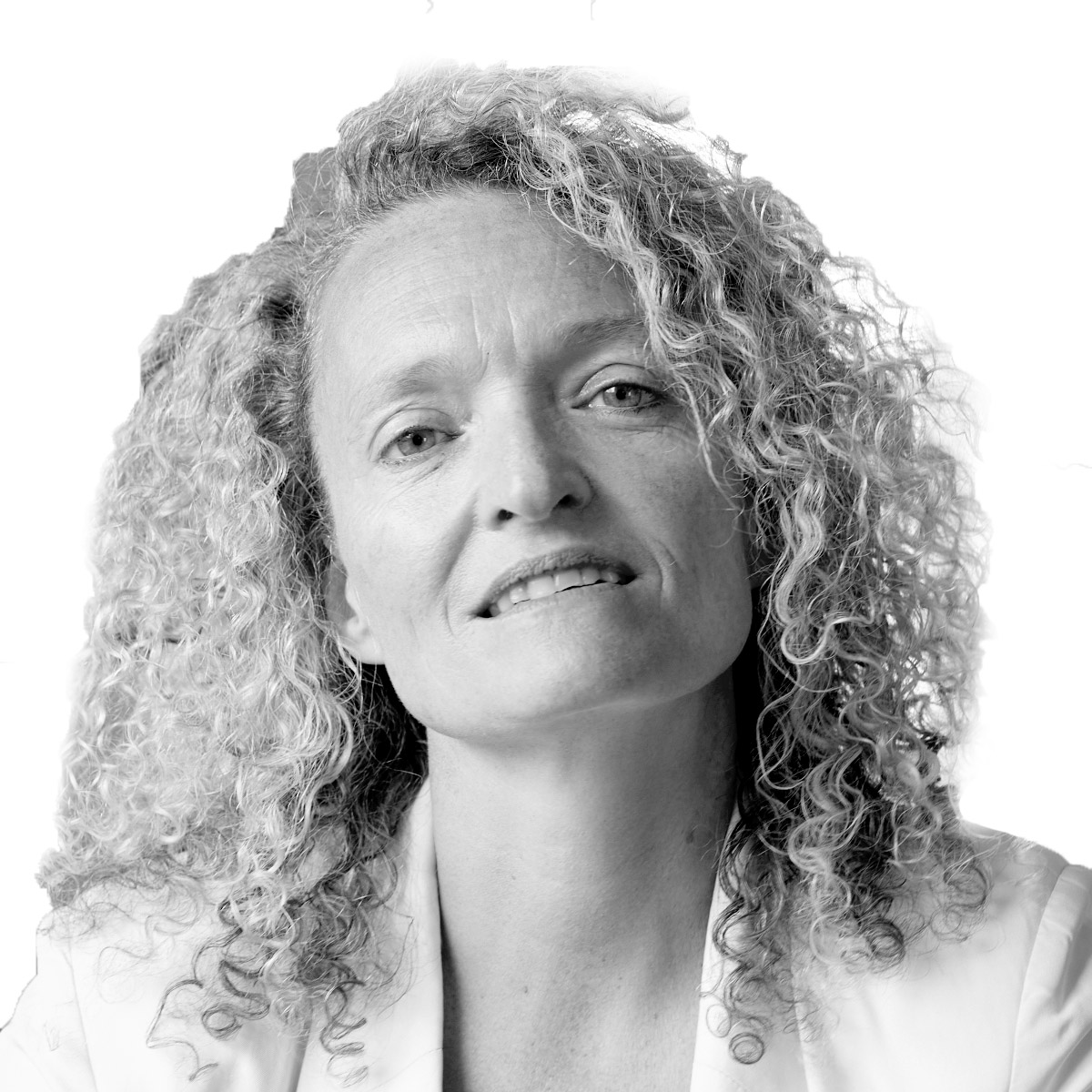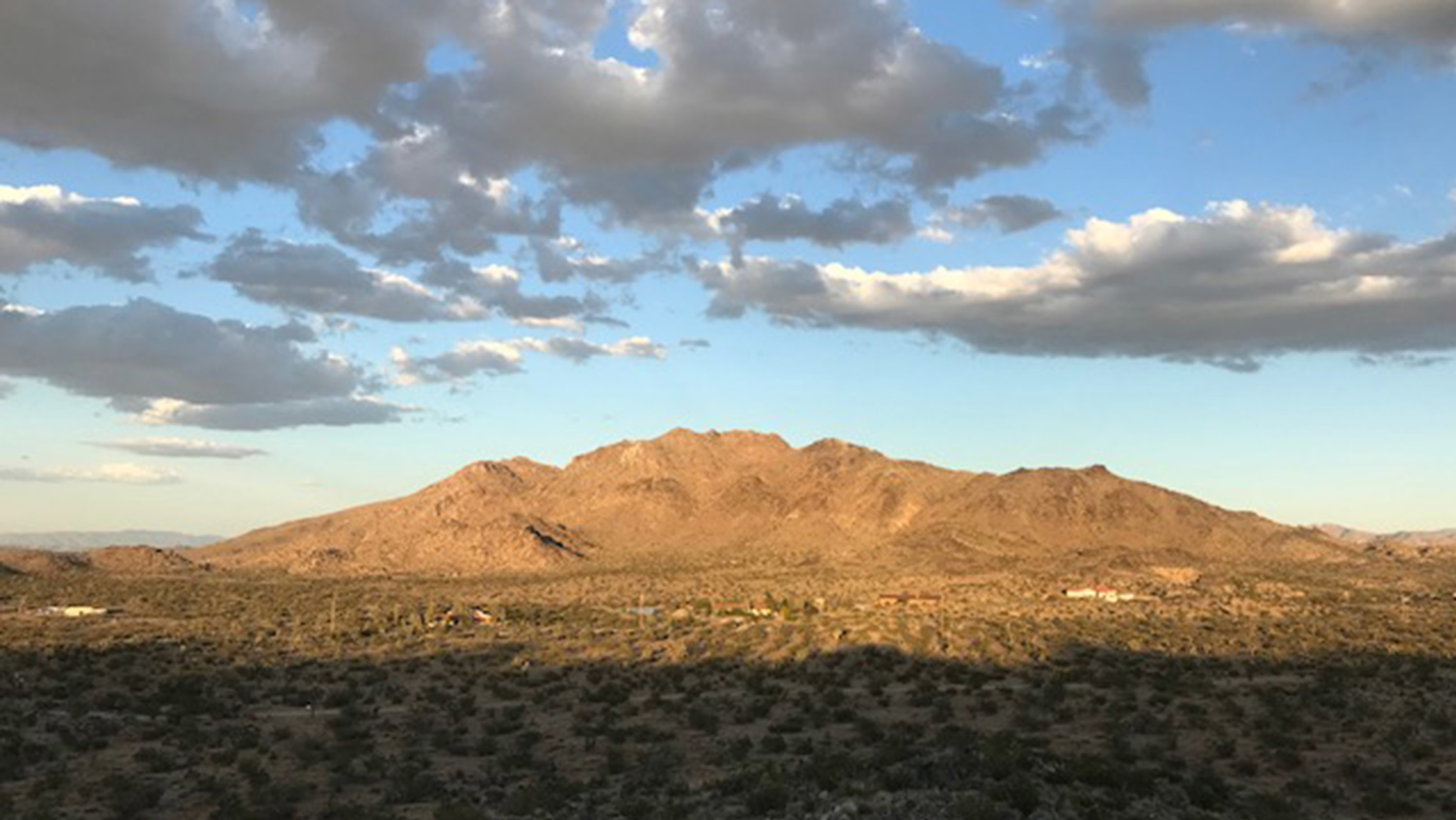Living the Little House On The Prairie life has been a dream of mine since childhood, and lockdown in the Californian desert has given me the chance to do it for real. Except it’s not quite how I imagined.
On the one hand, there are the rabbits, the hummingbirds, the friendly coyote, the exotic plants, the rocks, the rising sun yoga, not to mention the endless time to eat cannabis edibles and idle time away trying out new sex toys as I watch bees buzzing in the creosote bushes and ravens soaring in the endless skies.
Then there’s that incredible light. Every morning, I leap out of bed at 5:30 to greet the dawn, the texture of which feels like that line from Aldous Huxley’s 1954 backpacker classic, The Doors of Perception, when he drops his first mescaline pill. “I was seeing what Adam was seeing on the morning of his creation—the miracle, moment by moment of naked existence.”
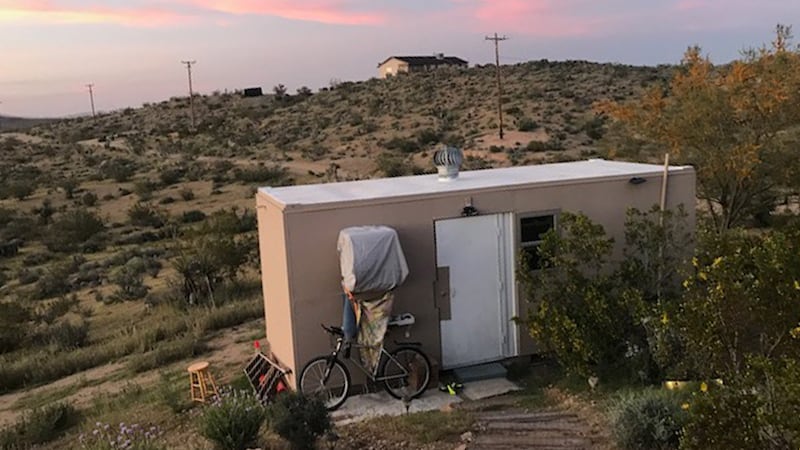
Folks like Caroline Ingalls and Jesus Christ didn’t go to the jungle to get their sense of freedom and inspiration. They went to the wilderness. The desert has the ability to shut down the chattering of the mind, like no other landscape. And the romance of the very idea of it!
I’m living in a shipping container called Bird Nest in Yucca Valley, just up the street from Joshua Tree National Park in the 1,400 square mile expanse of the Mojave desert known as the Morongo Basin. My social media friends write to tell me that I’m “living the dream.”
I don’t tell them that I go to sleep in the blackness of Bird Nest every night clutching my ancient iPod that plays The Sound of Music on a loop. The perky voice of Julie Andrews seems protection against the scary spiders and the things I hear rustle and flap when I haven’t got the music on. The little “eek!” and “oof!” noises I make when I think I hear or see something spooky are just pathetic.
Then there’s the question of the mouse. As I write this, there is a mouse poking its head out from under my bed. In my heart, I know it is actually a small rat but “mouse” sounds more innocuous. It’s a “Kangaroo Rat” actually, and this I know because there was a feature about it in last week’s edition of the Hi-Desert Star—along with a letter from a man telling the person who wrote him “hate mail” about the flag he flies outside his house that, “Addressing the envelope to ‘DJT’ worshipper is totally wrong; we do not worship President Trump, we worship Jesus Christ.”
When I came up here at the end of April, I worried that I was escaping COVID and I shouldn’t be up here having such a great time, but the truth is that the desert is both heaven and hell. Softness and bite. This is the longest I’ve stayed in the Californian desert.
The other morning, I woke up after my night with Julie Andrews and the spiders. The return of the sun! I took my yoga mat to my favorite expanse of yellow-flowered creosote bushes (the most drought-resistant plant in North America; they can go for two years without a drink) and “teddy bear” cholla cactus.
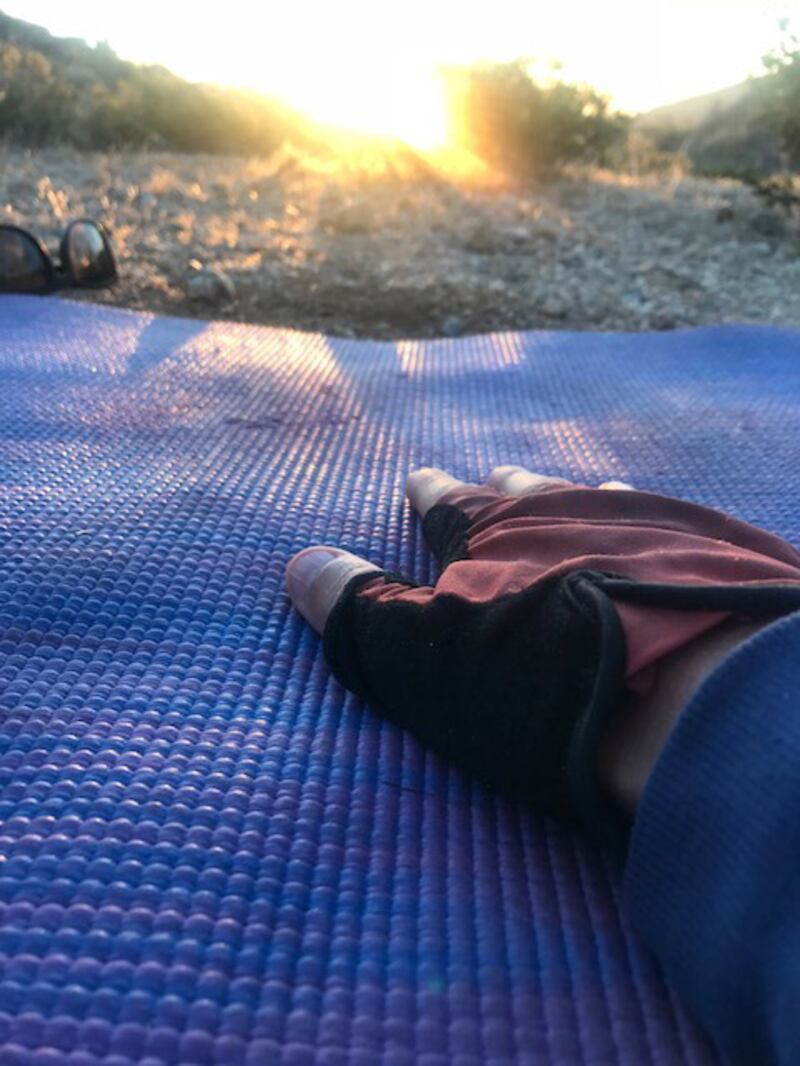
As I was doing a downward dog, I saw “my” coyote through my legs! I stopped my stretching and we sized each other up. A completely magical moment in the misty pink light of dawn. After a while he trotted off over the hill and I carried on with my yoga until some “teddy bear” spines got stuck in my hand (the bloody “stickers” are a constant).
I was attempting to gouge them out when I heard the wild screech of a coyote over the hill. This was followed by the voice of an angry woman and a gun shot. And then no more coyote scream. I forgot the pain in my hand.
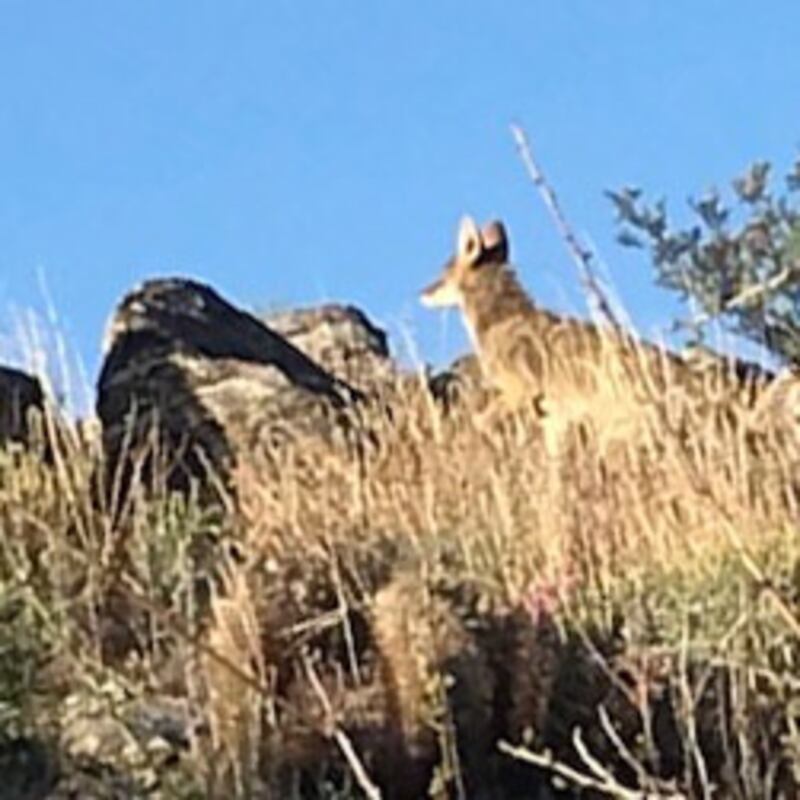
When I got back to base, my hostess, Olivia, was standing in front of her house at the top of the hill. Olivia de Haulleville is Aldous Huxley’s 83-year-old niece.
We met in 2015 when I was looking for the cheapest Airbnb in the desert (“Bird Nest” was $30 a night). Although her uncle gave her an LSD tab for her wedding present, her current trip is meditation and the philosophy of “Mitakuye Oyasin,” the Lakota Sioux for “all my relatives,” meaning that we are all connected: the two-legged, the four-legged, the ones that crawl on their bellies, the ones that swim, the mountains, the plants, the trees, everything.
Olivia told me she’d heard the shot too (“There was ice in my heart”). But I was shocked to learn that it’s not illegal to shoot coyotes here.
Inside Bird Nest (now Rat’s Nest) I found myself crying, because people want to live in the wilderness but they can’t deal with what the wilderness has to offer. And then, through my tears, I saw the “mouse” pop out again from under the bed (cue “eek” sound) and start walking toward the vicious-looking rat trap that Olivia had given me the previous day.
She’d told me, “It’s taken me 50 years to be able to kill anything,” as she handed me a massive rusty contraption loaded up with peanut butter. I held my breath now as I watched the “mouse” jump on the trap, lick peanut butter off its paws and then trot off again. I breathed a sigh of relief that I hadn’t just murdered a relative too, pushing to the back of my mind how I was going to feel when night-time came round again. (The Kangaroo Rat can leap distances of up to 9 feet.)
My mind started working overtime, so I went outside and peed in the baking heat under my friend, the creosote bush and the yucca with its leaves like daggers and the hummingbirds who I’ve now come to realize are kind of psychos, endlessly fighting—or is it cruising—and everything was heaven again.
This part of the desert isn’t even very pretty, especially in the glaring heat of the day, but it’s splendidly indifferent to human suffering and neurosis, even to this thing called COVID-19 that the two-legged are obsessed with right now. Alas for our plant relations, COVID equivalents loom large here too.
In the Kangaroo Rat edition of the Hi-Desert Star, an opinion piece from the Joshua Tree Gateway Association of Realtors expressed its “strong opposition” to considering listing the Joshua tree as a threatened species under the California Endangered Species Act. This was because it would have “significant consequences impacting the future development of raw land and on the housing prices in our communities.”
According to my lockdown reading material, this is classic “green frog skin” thinking. In my current book, Lame Deer, Seeker of Visions, Lakota medicine man John Fire Lame Deer laughs at how the white man could ever think of “owning” land with his dollars or “green frog skins.”
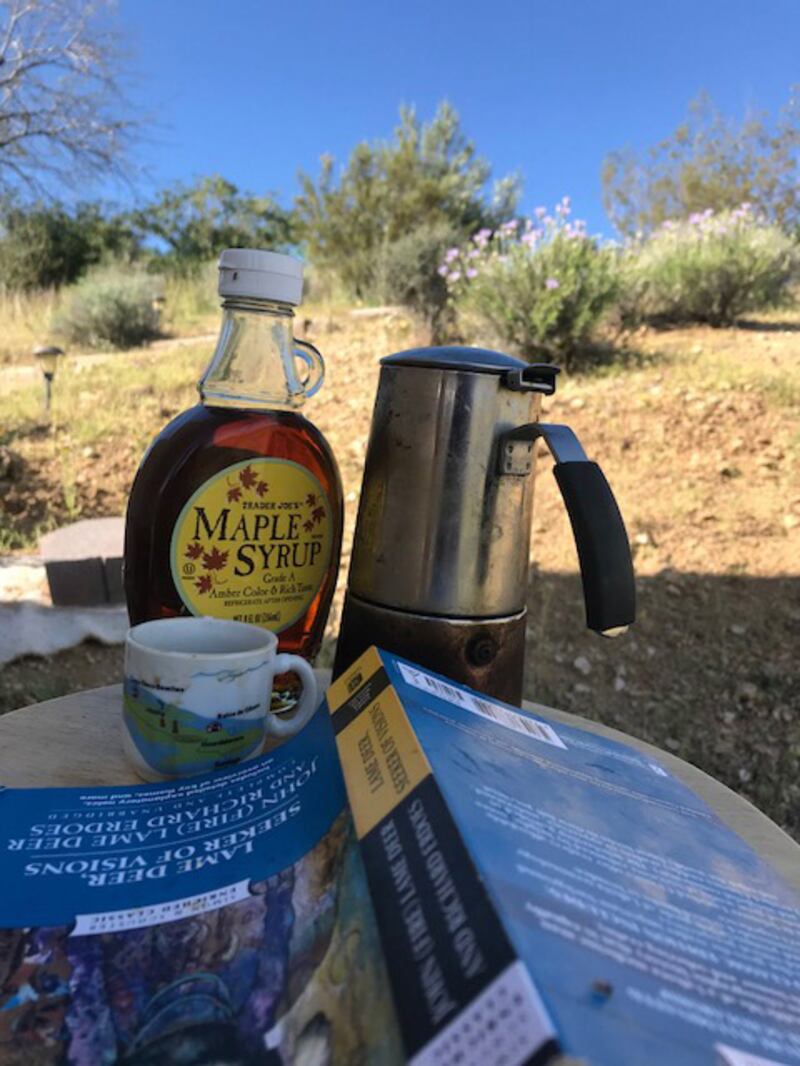
My desire to emigrate to the U.S. had a lot to do with shows such as Little House On The Prairie and those Hollywood movies about “pioneers” and cowboys. But now it is sinking in that the American Indians are the ones I should have been interested in. Their beliefs that the wilderness is the best kind of cathedral, that we are all related and that humility in the face of nature will keep us healthy, seem timely right now.
The next morning, in classic desert style, reality slaps me in the face when, on an early morning bike ride which starts out all scampering bunnies and garden of Eden lighting, I am accosted by a highway robber.
A kiddie-sized motorbike belching fumes, careering all over the road and being driven by a two-legged with green tattoos all over his face, is heading straight for my bike. At the last minute, he swerves but comes back a few minutes later and repeats the tactics. I peddle toward the highway in the hope that he’ll leave me alone. He continues to follow me, finally coming up alongside me. His eyes are wild. Crystal meth, I think. He seems way more messed up than my coyote who got shot.
I remember something Olivia told me about the Morongo Basin being the place where lots of LA county jail ex-felons are dumped. “You got any money?” he says. You never know how you will react when something like this happens. I try to distract him. “Yeah, over there. I’m going over there,” I said, gesticulating vaguely at the highway and upping my pedal power. He seems mesmerized for a moment and I make my escape.
It wasn’t an unusual encounter, I reflected afterwards, in a place where plants have leaves like daggers. A place of endless death and endless life. When I got back to the Little Shipping Container On The Prairie, Olivia was perching on a rock with a child-like grin all over her face. “Just look at this!” she exclaimed, pointing to a baby red poppy that had forced itself into existence overnight. “I feel I should say a prayer to it!”
